Tuesday, December 05, 2006
Centennial Tributes: Otto Preminger

By Edward Copeland
My first exposure to Otto Preminger came, as I'm sure it did for many in my age group, courtesy of the 1960s TV series of Batman where Preminger played one of the three Mr. Freezes during the series' run. For my money, he was the best as well, not to cast any aspersions on the interpretations of George Sanders (the first to play the role on the series) or Eli Wallach (the last). I had no idea about this Preminger guy, who would have turned 100 today, was a director. For me, he was just a bald guy with an accent playing a bizarre villain on a campy half-hour superhero show I enjoyed watching once school let out. Laura? Anatomy of a Murder? Those titles meant nothing to me at the time.
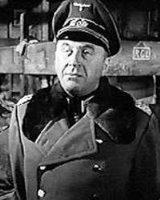 My memory is fuzzy as to whether by the time I saw Preminger play Col. von Scherbach in Billy Wilder's Stalag 17, I was aware of his directing career. I do know for certain that I saw Stalag 17 long before I ever saw Jean Renoir's Grand Illusion. Granted, the films and von Scherbach vs. Capt. von Rauffenstein (Erich von Stroheim) couldn't be more different, Preminger's German POW camp official certainly pales compared to von Stroheim's. However, that shouln't be seen as taking anything away from Preminger or Wilder's darkly comic Stalag 17. I didn't decide to do this centennial tribute to Preminger based on his acting — it's his directing that stands out, as inconsistent as it often was. It probably isn't fair to lump the two together just because they are bald German directors playing army officials in POW camps, but I subconsciously do it anyway. So, without further ado, let's look back at Preminger's extensive filmography, or at least his directing efforts that I've managed to see.
My memory is fuzzy as to whether by the time I saw Preminger play Col. von Scherbach in Billy Wilder's Stalag 17, I was aware of his directing career. I do know for certain that I saw Stalag 17 long before I ever saw Jean Renoir's Grand Illusion. Granted, the films and von Scherbach vs. Capt. von Rauffenstein (Erich von Stroheim) couldn't be more different, Preminger's German POW camp official certainly pales compared to von Stroheim's. However, that shouln't be seen as taking anything away from Preminger or Wilder's darkly comic Stalag 17. I didn't decide to do this centennial tribute to Preminger based on his acting — it's his directing that stands out, as inconsistent as it often was. It probably isn't fair to lump the two together just because they are bald German directors playing army officials in POW camps, but I subconsciously do it anyway. So, without further ado, let's look back at Preminger's extensive filmography, or at least his directing efforts that I've managed to see.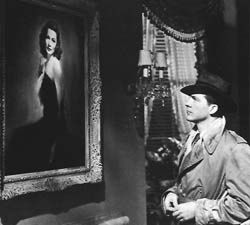
Laura wasn't Preminger's first film as a director but, for better or worse, I think it still stands as his crowning achievement, even though it came so early in his career. Based on a novel by Vera Caspary, the screenplay by Jay Dratler, Samuel Hoffenstein and Betty Reinhardt (with alleged uncredited contributions from Ring Lardner Jr.), powers what would be an otherwise routine noirish mystery with its sharp and witty screenplay full of memorable dialogue. It also has one of the most recognizable film scores ever by David Raksin). For the uninitiated, the socially connected Laura Hunt (Gene Tierney) has been murdered and police detective Mark McPherson (Dana Andrews) has the assignment of ferreting out the killer from her circle of acquaintances, prompting him to comment, "I must say, for a charming, intelligent girl, you certainly surrounded yourself with a remarkable collection of dopes." McPherson may call them dopes, but the actors who played them bit into the roles and classic lines with great glee.
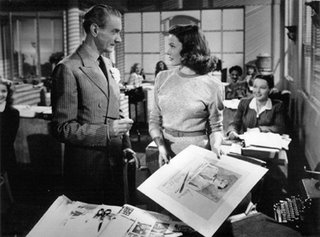
From Vincent Price as Shelby Carpenter as Laura's on again-off again cad of a fiance ("I can afford a blemish on my character, but not on my clothes.") to the socially connected Ann Treadwell (Judith Anderson), who longs for Shelby herself ("He's no good, but he's what I want. I'm not a nice person, Laura, and neither is he. He knows I know he's just what he is. He also knows that I don't care. We belong together because we're both weak and can't seem to help it."). Standing above them all though is Clifton Webb's Oscar-nominated turn as Waldo Lydecker, a Walter Winchell-esque columnist and broadcaster ("I don't use a pen. I write with a goose quill dipped in venom.") who really transformed Laura into the social maven she became. In many respects, Lydecker resembles a cinematic antecedent of George Sanders' great Addison de Witt in All About Eve. For the trivia-obsessed, it's worth noting that not only did Twin Peaks make some obvious allusions to Laura, but paid tribute to Webb's character as well, naming the mynah bird Waldo whose veterinarian was named Dr. Lydecker. Re-watching Laura recently, it's amazing what a spell it can still cast 60-plus years later.
Preminger's immediate followup to Laura reunited him with Dana Andrews and kept him in the noirish realm, though Fallen Angel intriguingly keeps the audience guessing for awhile about where exactly it is heading.
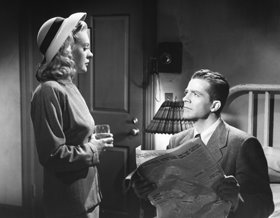 Instead of a police detective, this time Andrews is Eric Stanton, a hustler and a con man who lands in the small town of Walton because he lacks the bus fare to get all the way to San Francisco. He bluffs his way into a job with a traveling psychic charlatan, a sort of John Edward for the 1940s (played by John Carradine) which brings him in contact with the sheltered sister (Alice Faye) of a Havisham-esque older sister (Anne Revere, the same year she won the Oscar for supporting actress for National Velvet) determined to protect her from the misfortune she suffered in romance. Stanton sees her as possible mark so he can make enough money to woo the real object of his affection — the cool, manteaser Stella (Linda Darnell). On top of these characters, there is that of Mark Judd (Charles Bickford), a retired cop who takes on the role of a special investigator when somebody winds up dead. Fallen Angel doesn't hit the heights that Laura did, but it's an entertaining and intriguing film. It also is worth noting that Fallen Angel displays Preminger's first fascination with interesting credit sequences, though not by Saul Bass, as a bus drives down the highway past the cast and crew depicted on road signs seen through the window.
Instead of a police detective, this time Andrews is Eric Stanton, a hustler and a con man who lands in the small town of Walton because he lacks the bus fare to get all the way to San Francisco. He bluffs his way into a job with a traveling psychic charlatan, a sort of John Edward for the 1940s (played by John Carradine) which brings him in contact with the sheltered sister (Alice Faye) of a Havisham-esque older sister (Anne Revere, the same year she won the Oscar for supporting actress for National Velvet) determined to protect her from the misfortune she suffered in romance. Stanton sees her as possible mark so he can make enough money to woo the real object of his affection — the cool, manteaser Stella (Linda Darnell). On top of these characters, there is that of Mark Judd (Charles Bickford), a retired cop who takes on the role of a special investigator when somebody winds up dead. Fallen Angel doesn't hit the heights that Laura did, but it's an entertaining and intriguing film. It also is worth noting that Fallen Angel displays Preminger's first fascination with interesting credit sequences, though not by Saul Bass, as a bus drives down the highway past the cast and crew depicted on road signs seen through the window.Preminger still was concentrating in the noirish realm with this one, but it doesn't come close to Laura or Fallen Angel. He teams again with Gene Tierney and Charles Bickford, but neither equals their earlier success with the director in this mostly, dull and uninvolving story of a woman trying to conceal her kleptomania from her shrink husband (Richard Conte) who falls prey to a hypnotist with a penchant for blackmail and theft (José Ferrer). Ferrer really is the only one who scores any points in this outing — but it's not enough to make this one worth remembering.
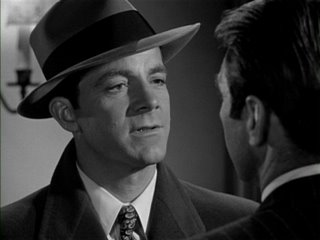
Preminger reunited with Dana Andrews and Gene Tierney for this twisty detective tale. In a way, it's reminiscent of Fallen Angel in that its direction seems to keep shifting. It begins in the squad room of New York's 16th Precinct where Sgt. Mark Dixon (Andrews) is once again being dressed down for his brutal treatment of suspects, then it shifts to an underground gambling room run by the hood Scalisi (Gary Merrill) where a man is winning too much and a woman (Tierney) dragged there by her estranged husband (Craig Stevens) wants to leave. Soon, abuse and death follow — but then the story take another unexpected beat when Dixon pursues the case under the watchful eye of his straight-arrow new commander (Karl Malden). To divulge many more details would lessen the film's fun, which contains some of Preminger's most taut direction and one of Andrews' best performances, though Tierney's part seems almost an afterthought.
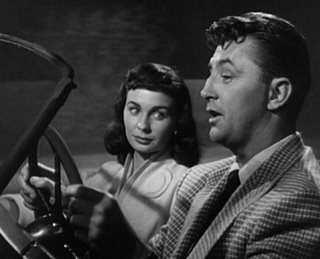
Glenn Close's Alex Forrest in Fatal Attraction has nothing on Jean Simmons' Diane Tremayne here. While most of Preminger's earliest works have been collectively dumped into the noir category, none comes as close to the typical noir formula as Angel Face does, though even that comes with a difference. Diane is not your run-of-the-mill femme fatale out for her own ambitious interests such as Barbara Stanwyck in Double Indemnity or Linda Fiorentino in The Last Seduction, she does the things she does in the name of obsessive love, for her father (Herbert Marshall) and an unfortunate ambulance driver (Robert Mitchum) who crosses her path. Another thing that sets thie film apart from most noir outings is that just about everyone (with the exception of her father) spot what she is up to almost from the beginning, yet it still doesn't stop them from becoming her victims. Mitchum's Frank Jessup doesn't seem to be your standard dupe, but toward the end when he makes one decision you want to slap yourself in the head for his stupidity. Following Where the Sidewalk Ends, Preminger was on quite a roll in the early 1950s.

For a country founded on principles of free speech, the United States sure has a lengthy record of frequent attempts by supposedly solid American citizens going apeshit over words. This tendency hit Preminger when he sought to bring his stage success, The Moon Is Blue, to the big screen and ignited a massive controversy because the film seemed to make light of seduction and use words such as "virgin" and "pregnant." Oh my word — how did the republic ever survive such a thing? Perhaps it survived because artists such as Preminger ignored the moralists and made the movie he intended without changing a word or a plot line. Of course, the controvery seems quite silly now, but The Moon Is Blue does remain an entertaining light comedy about two men (William Holden, David Niven) seeking to seduce a "professional virgin" (Oscar nominee Maggie McNamara). While the movie certainly still shows its theatrical origins, it is a lot of fun and the actors are all fine, especially Niven who may have delivered one of his wittiest performances ever as the father of Holden's girlfriend and McNamara's would-be seducer.
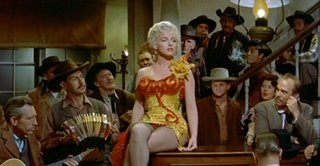
This hokiest-of-the-hokey Western seems really out of place in Preminger's filmography, coming as it does as Preminger seems to have made his move toward more purposefully daring subject matter. With stiff performances by Robert Mitchum and Marilyn Monroe and more cliches than you can count, it wears on one's patience, even with a mercifully brief 90 minute running time. The CinemaScope imagery is lush and beautiful, but it can't compensate for the insipid story.
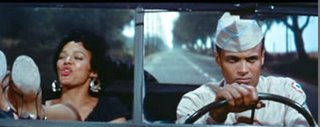
This adaptation of the stage musical might have seemed daring for its time as Oscar Hammerstein brought colloquial lyrics to a modern version of Bizet's Carmen. It still plays well enough and has good performances from its cast, but perhaps its lasting legacy is landing Dorothy Dandridge the first lead actress nomination to ever go to an African American.
This true-life tale of a patriotic military man who challenged the system about the neglect and unsafe practices of its air fleet following the death of a close friend is a fairly straight-forward courtroom drama for most of its running time and the stolid Gary Cooper seems the perfect choice to fill out the role. There's not a lot there to rail against, but there isn't a lot to recommend viewing it for either. For television fans, it's interesting to note the presence of many later TV stars such as Elizabeth Montgomery, Peter Graves and Jack Lord among its cast. This film seems like another 1950s aberration from Preminger.

I had hoped very much to re-watch this film before I wrote this piece, but finding a copy (without buying one) has been impossible to catch in time and TCM isn't airing it until after Preminger's birthday, so I'm having to rely on my memory. What I do remember was this was the first Preminger film I remember seeing where his fun with the opening credits almost threatened to overwhelm the film itself. Frank Sinatra gave a good performance and I can see how its portrait of drug addiction was harrowing at the time of its release, but it seemed somewhat tepid by the time I saw it after seeing later, even more brutal film displays of drug addiction such as Drugstore Cowboy, Rush and other films, good, bad and mediocre.
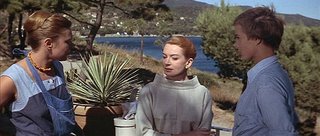
I've watched this trifle even more recently than The Man With the Golden Arm, yet it left even less of an impression. Jean Seberg plays the widowed David Niven's grasping daughter who does everything she can to undermine his budding romances, particularly one with Deborah Kerr, whose fine performance is about the only thing I remember about this film beyond its gorgeous cinematography and scenery.
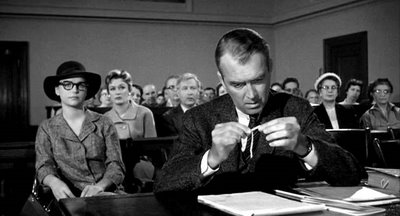
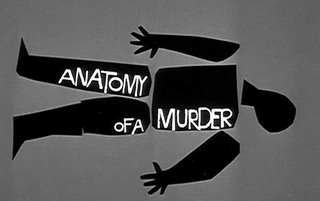
Having re=watched this again, I reconfirmed that after Laura, this riveting courtroom drama remains at the top of the Preminger canon. Great performances from Jimmy Stewart, Arthur O'Connell, George C. Scott and Eve Arden. Taut direction from Preminger. An absolutely great jazz score by the legendary Duke Ellington, who cameos. Another brilliant title sequence from Saul Bass. Among all the excellent attributes this film offers, I believe the best asset is Lee Remick as possible rape victim and the wife of murder defendant Ben Gazzara. Her party girl masquerading as a good girl is her best performance and her drunk scenes certainly outshine her similar scenes that earned her an Oscar nomination years later in the tepid Days of Wine and Roses. Anatomy of a Murder was another one of Preminger's 1950s efforts steeped in controversy over its straight-forward use of language in dealing with the issues of rape during the course of its trial, but it's much more than that. It's simply one of the best courtroom dramas ever put on film.
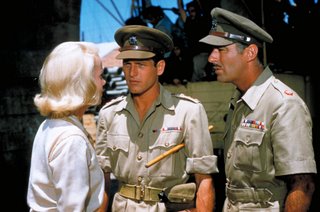
As the decades rolled over into the 1960s, Preminger begin to experiment with EPIC FILMMAKING, which unfortunately turned out to be EPIC BORES, especially in the case of this film which boasts a fine cast including Paul Newman, Eva Marie Saint, Ralph Richardson, Lee J. Cobb and an inexplicable Oscar nomination for Sal Mineo. You would think that a fascinating film could be made telling about the founding of the state of Israel, but Preminger's film proves so plodding and long — 3 hours and 28 minutes to be exact — that it's just a chore to sit through. You almost wish Preminger's desire to stoke controversy had reared its head more often in this film, but it just seems to try too hard to be tasteful and plays like a lecture.
Admittedly, I'm a sucker for political movies done well and while there certainly have been many done better than Advise and Consent, with its insanely strong cast especially (I'm sure Gloria will love me for this) Charles Laughton as a scheming Southern senator, Walter Pidgeon as the Senate majority leader and Burgess Meredith as a nervous witness brought in to try to sink the president's nominee for secretary of state. There certainly have been better (and shorter) political dramas, but it's still fun for a political junkie such as myself. It also includes another fun Saul Bass credit sequence and even Betty White as a senator.
As bloated as Exodus turned out to be, it plays like a breakneck carnival ride when compared with this turkey. What hampers it most is Tom Tryon as the lead, since the film chronicles the journey of his priest character through as many "issues" as it can shoehorn into its timeline — and it bored me silly. Even though John Huston earned a supporting actor Oscar nomination as a cardinal, I was even disappointed in his performance — and he usually was reliably fun in his acting. Then again, by each time his character would appear, I was so beaten down by fatigue and disinterest, it would have been hard for even the greatest actor to grab my attention. The technical aspects, as usual, are reliably great, but the movie and Tryon are stiff as a board.
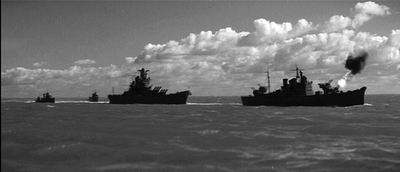
One shouldn't expect a typical World War II drama from Preminger, especially coming this late in his career when his products tended to be epic in scope and require a certain amount of cynicism or controversy. In Harm's Way certainly must contain Preminger's most star-studded cast — John Wayne, Kirk Douglas, Patricia Neal, Dana Andrews, Burgess Meredith, Franchot Tone and Henry Fonda (giving one of the worst Southern accents in film history). That's leaving out small roles by the likes of Carroll O'Connor, George Kennedy, Stanley Holloway, Slim Pickens and a don't-blink-or-you'll-miss-him appearance by Larry Hagman. Unfortunately, it is difficult not to blink as you try to endure the 2 hours and 45 minutes of this fractured narrative. It starts typically enough on the eve of Pearl Harbor and even seems to contain allusions to From Here to Eternity as the Japanese attack occurs while an adulterous officer's wife and her lover are awaking from their tryst on the beach. In fact, some of the setup of this scene reminded me of the opening beach scene of Jaws that would come 10 years later. The film does have a lot of interesting elements that you wouldn't expect to find in a World War II drama — especially one coming less than 25 years after Pearl Harbor. One character even characterizes the war as something FDR trumped up, which while certainly said in public was nearly verboten for a mainstream Hollywood film. It also contains a large dose of cynicism about military politics and missteps following the attack. Unfortunately, those are just minor elements in this meandering mess which too often resembles more soap opera than war tale and in which characters can take sudden turns from cantankerous but worthy officers into rapists. Still, the stark black-and-white cinematography is stunning, making some of the night naval scenes appear as if the ships are slicing through oil instead of the ocean.
Though Preminger made a few films after this one, this was the most recent that I've managed to see and while it doesn't live up to his greatest works, it was a welcome relief from his bloated 1960s epics. It's a strange little thriller about a woman (Carol Lynley) who reports her daughter missing, though the police suspect that the girl may never have existed. Again, great Saul Bass credits and it contains an unusually subdued performance by Laurence Olivier as a detective, though Keir Dullea is too much of a stiff to pull off the character he's assigned to play. It also is most fascinating to see how the film's central idea has been swiped so often recently in films such as The Forgotten and Flight Plan. In fact, next year Reese Witherspoon stars in an actual remake of the movie.
Tweet
Labels: Cooper, Deborah Kerr, Eve Arden, Ferrer, G. Tierney, George C. Scott, Hammerstein, Holden, Huston, J. Stewart, Jean Simmons, Laughton, Malden, Marilyn, Mitchum, Niven, Olivier, Sinatra, Vincent Price
Comments:
<< Home
Wow, Edward! This is quite a post. You can say what you want about River of No Return (and I thought you were mostly right) but Robert Mitchum gives Monroe one of the great rub-downs. Nice stuff.
And no film outside John Huston's The Bible was more disappointingly dull than Exodus for me. That was pretty unwatchable.
I would part company over In Harm's Way. There's a ton of interwoven stories against the backdrop, but he manages to tie them together into a pretty solid drama. And the military politics stuff (and the political stuff in general) was well expressed: the fingerpointing, the demands for the chopping of heads - human nature. He could've dwelt on that stuff more, but I thought the movie gave it some due. The JFK allusions were pretty contrived. And you were right: it was a beatifully filmed picture.
And no film outside John Huston's The Bible was more disappointingly dull than Exodus for me. That was pretty unwatchable.
I would part company over In Harm's Way. There's a ton of interwoven stories against the backdrop, but he manages to tie them together into a pretty solid drama. And the military politics stuff (and the political stuff in general) was well expressed: the fingerpointing, the demands for the chopping of heads - human nature. He could've dwelt on that stuff more, but I thought the movie gave it some due. The JFK allusions were pretty contrived. And you were right: it was a beatifully filmed picture.
An impressive summary of Preminger's career!
With the exception of Laura, I've never seen a Preminger film that I thought was entirely successful - most of them get bogged down in their own sensationalism, particularly Anatomy of a Murder, which is a little too self-consciously engineered for shock value to be credible. But there's no denying that Preminger had a way with performers, pushing them beyond their comfort zone to reveal more complexity - I don't think anyone ever brought out more "darkness" in Deborah Kerr, Jean Simmons, Frank Sinatra, Lee Remick or Dana Andrews.
When Preminger tried for lightness, the results could be painful. For me, The Moon is Blue has always played like a one-joke film, and a relentlessly cute one at that - it's a precursor to the Rock Hudson-Doris Day sex comedies that came later in the decade, and I don't think it's really any more risque or interesting. I find McNamara's nomination exceedingly puzzling. In a way, it's sort of remarkable how all of her line readings sound exactly alike, with no variation in tone or inflection - she might as well be saying the SAME line over and over again. It's the very definition of a one-note performance, but I suppose some people find that kind of thing charming - the same way they respond to Shirley Temple. At least Shirley cried sometimes.
With the exception of Laura, I've never seen a Preminger film that I thought was entirely successful - most of them get bogged down in their own sensationalism, particularly Anatomy of a Murder, which is a little too self-consciously engineered for shock value to be credible. But there's no denying that Preminger had a way with performers, pushing them beyond their comfort zone to reveal more complexity - I don't think anyone ever brought out more "darkness" in Deborah Kerr, Jean Simmons, Frank Sinatra, Lee Remick or Dana Andrews.
When Preminger tried for lightness, the results could be painful. For me, The Moon is Blue has always played like a one-joke film, and a relentlessly cute one at that - it's a precursor to the Rock Hudson-Doris Day sex comedies that came later in the decade, and I don't think it's really any more risque or interesting. I find McNamara's nomination exceedingly puzzling. In a way, it's sort of remarkable how all of her line readings sound exactly alike, with no variation in tone or inflection - she might as well be saying the SAME line over and over again. It's the very definition of a one-note performance, but I suppose some people find that kind of thing charming - the same way they respond to Shirley Temple. At least Shirley cried sometimes.
I think In Harm's Way could have been so much better if he hadn't tried to stuff so much into it. The developments with the Kirk Douglas character in particular really seem out of a different movie and the Tom Tryon-Paula Prentiss scenes reminded me of the girl saying goodbye to her soldier boyfriend at the beginning of Airplane!
Well, I'm not going to love you, not only for the Laughton mention, but for the Preminger article tout suite. "River of No Return" is the first movie I watched in my childhood that can recall vividly, and "Laura" is one of my favourite films ever. I had recently a Preminger season in my nearest cinematheque (of course I seized the occasion to watch "Advise and Consent" in the proper big screen: I daresay that the film resists the passage of time nicely).
BTW, don't you think that Preminger, as Lean, are more enjoyable in their early, non-blockbuster/epic films?
BTW, don't you think that Preminger, as Lean, are more enjoyable in their early, non-blockbuster/epic films?
Definitely. Once he started getting larger in scope, the more his films lost something, especially with the interminable Exodus and The Cardinal.
Post a Comment
<< Home


